

Silly Beliefs - Respect My Religion! Introduction The Decline of ReligionRespect Our ReligionTolerate our Religion Readers' Comments Introduction.
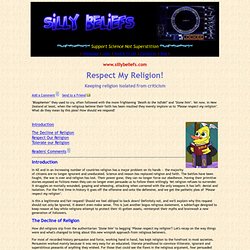
About the Institute for Ethics and Emerging Technologies. Critical theory. Critical theory is a school of thought that stresses the reflective assessment and critique of society and culture by applying knowledge from the social sciences and the humanities.
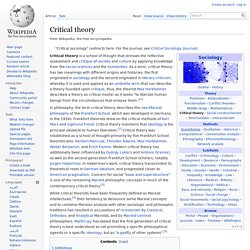
As a term, critical theory has two meanings with different origins and histories: the first originated in sociology and the second originated in literary criticism, whereby it is used and applied as an umbrella term that can describe a theory founded upon critique; thus, the theorist Max Horkheimer described a theory as critical insofar as it seeks "to liberate human beings from the circumstances that enslave them. "[1] In philosophy, the term critical theory describes the neo-Marxist philosophy of the Frankfurt School, which was developed in Germany in the 1930s.
Untitled. Ethics in Research and publication: Home. The Ethics in Research & Publication program is the collaboration of an independent panel of experts in research and publishing ethics and Elsevier.
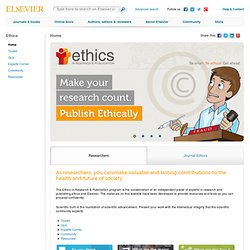
The materials on this website have been developed to provide resources and tools so you can proceed confidently. Scientific truth is the foundation of scientific advancement. Present your work with the intellectual integrity that the scientific community expects. The Publishing Ethics Resource Kit (PERK) is an online resource to support journal editors in handling publishing ethics issues. This WordPress.com site is the cat’s pajamas. Secular Morality. Some say that if we live in a godless universe there's no basis for morality, that is principles concerned with the distinction between right from wrong, or good and bad behavior, or character.
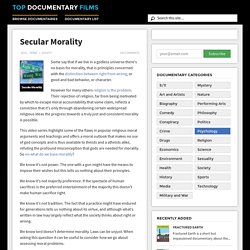
However for many others religion is the problem. Their rejection of religion, far from being motivated by which to escape moral accountability that some claim, reflects a conviction that it's only through abandoning certain widespread religious ideas the progress towards a truly just and consistent morality is possible. This video series highlight some of the flaws in popular religious moral arguments and teachings and offers a moral outlook that makes no use of god concepts and is thus available to theists and a atheists alike, refuting the profound misconception that gods are needed for morality.
So on what do we base morality? We know it's not power. We know it's not majority preference. We know it's not tradition. We know lord doesn't determine morality. Humanism. The Thinking Atheist. QualiaSoup. Humanist Manifesto. Humanist Manifesto is the title of three manifestos laying out a Humanist worldview.
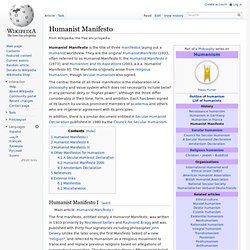
They are the original Humanist Manifesto (1933, often referred to as Humanist Manifesto I), the Humanist Manifesto II (1973), and Humanism and Its Aspirations (2003, a.k.a. Humanist Manifesto III). The Manifesto originally arose from religious Humanism, though secular Humanists also signed. The central theme of all three manifestos is the elaboration of a philosophy and value system which does not necessarily include belief in any personal deity or "higher power", although the three differ considerably in their tone, form, and ambition. Each has been signed at its launch by various prominent members of academia and others who are in general agreement with its principles. What you can do to help. National Secular Society - Challenging Religious Privilege. Council for Secular Humanism.
Evolutionary ethics. Evolutionary ethics is a term referring equally to a form of descriptive ethics or normative ethics.
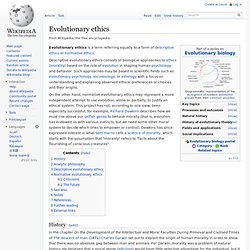
Descriptive evolutionary ethics consists of biological approaches to ethics (morality) based on the role of evolution in shaping human psychology and behavior. Such approaches may be based in scientific fields such as evolutionary psychology, sociobiology, or ethology with a focus on understanding and explaining observed ethical preferences or choices and their origins. History[edit] Science of morality. "The Good Samaritan" by François-Léon Sicard.
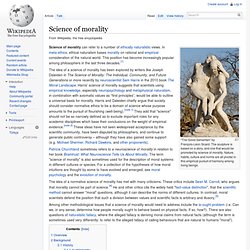
The sculpture is based on a story, and one that would be promoted by science of morality. Nature, habits, culture and norms are all pivotal in this empirical pursuit of harmony among living beings. Science of morality can refer to a number of ethically naturalistic views. In meta-ethics, ethical naturalism bases morality on rational and empirical consideration of the natural world. This position has become increasingly popular among philosophers in the last three decades.[1] Patricia Churchland sometimes refers to a neuroscience of morality in relation to her book Braintrust: What Neuroscience Tells Us About Morality. Secular humanism. The philosophy or life stance of secular humanism (alternatively known by some adherents as Humanism, specifically with a capital H to distinguish it from other forms of humanism) embraces human reason, ethics, and philosophical naturalism while specifically rejecting religious dogma, supernaturalism, pseudoscience, and superstition as the basis of morality and decision making.[1][2][3][4] The International Humanist and Ethical Union (IHEU) is the world union of more than one hundred Humanist, rationalist, irreligious, atheistic, Bright, secular, Ethical Culture, and freethought organizations in more than 40 countries.
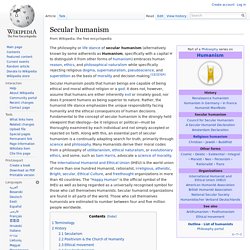
The "Happy Human" is the official symbol of the IHEU as well as being regarded as a universally recognised symbol for those who call themselves Humanists. Secular humanist organizations are found in all parts of the world. Those who call themselves humanists are estimated to number between four and five million people worldwide. Terminology[edit] History[edit] Case law[edit]